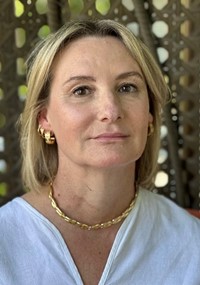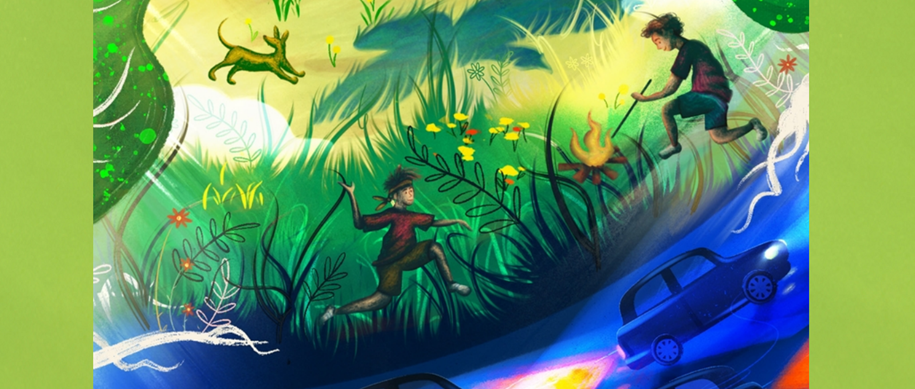Tania Unsworth


About Author
Tania Unsworth's new book, Nowhere Island, explores how four children survive on an island hidden from sight. Tania spent her childhood in Cambridge before moving to America in her early twenties. She comes from a literary, Booker Prize-winning family of writers and lives in Boston, USA, with her husband and two sons. THE ONE SAFE PLACE was her first children's novel.
www.taniaunsworth.com; Twitter: @TaniaUnsworth1
Interview
Nowhere Island (Zephyr)
August 2023
In Nowhere Island, we meet three children who find themselves on an 'island' in a traffic highway, hidden from the world. Each of the children has a reason to hide, from their past and from themselves, but when a fourth child arrives, Gil, things start to change as they start to learn to trust again.
Review: "Gil escaped just after his twelfth birthday in the middle of the afternoon." I was gripped from the opening line of this original and compelling story - who wouldn't need to read on?
Read a Chapter from Nowhere Island

Q&A with Tania Unsworth
Author Tania Unsworth tells us what inspired this story and its setting, what were the challenges in writing about children cut off from the world, and explores the question of what makes a family?
1. Can you tell us a little about yourself and your writing?
Writing is hard for me. I write very slowly and have a cruel inner critic. So why do I do it? I don't have a good answer to that question, except to say that however difficult writing may be for me, not writing feels worse. It's complicated…What I do know however, is that I was a reader long before I was a writer. It was my love of reading that made me want to write. Or rather, the way reading made me feel when I was a child, as if - like the Tardis - I was far bigger on the inside than the outside.
I write for children not because it's 'easier' than writing for adults as some people may think (in fact, in many ways it's harder) but because childhood is where reading - and writing - habits are born. To cause just one reader to fall in love with stories and the beautiful things that language can do, makes the whole messy, complicated business of writing feel worth it.
Some of my books have done better than others, but each one feels like a triumph to me. I'm always a bit astonished that I actually managed to finish!
2. What happens in your new book, Nowhere Island?
Nowhere Island is the story of four runaway children who take refuge on a large green space dividing the lanes of a busy motorway. It's the perfect hideout, not just because the green space is screened by trees, but because nobody really looks at the place as they whizz by in their cars. The island is right there, yet it is invisible. The book describes how the children survive, how they find food and shelter, and by overcoming a series of obstacles and adventures, how they discover something even more important - a sense of belonging that they have never known before.
3. What inspired this story about four children, cut off from the world?
I've always been fascinated by the places that we look at without ever really seeing. Patches of wasteland, abandoned plots, neglected corners and yes, the green spaces that divide motorways. Small as these areas are, they are true wildernesses, simply because they are overlooked by the world. Anything might be living there. Anything might be happening…
4. Did you have a specific place in mind for this motorway setting?
Apart from it being set in America, where the highways are often broad and the green spaces dividing them very large, I didn't want to be specific about the precise location. I wanted the place to seem as if it might be anywhere. Somewhere the reader herself might have passed on a long road trip, staring out of the window of the car, the island no more than a brief green blur…
5. What were the challenges in writing about children left to survive on their own?
I had to think long and hard about how to make the story believable in terms of how these children could live for weeks on the island without an obvious source of food or shelter. But the good thing about problems is that they force you to become inventive. And the solutions often end up shaping the story in new and better ways.
How do the children eat? Well, maybe they have a dog they have trained to help them steal from passing cars. And perhaps there is a girl on the island with incredible survival skills who can teach the others how to build shelters and how to find food in the wild. But how does she know these things? Could she come from some sort of doomsday cult? Now that could be very interesting…
6. Why did you decide to focus on Gil? How does he change the dynamics of Nowhere Island when he arrives?
While all the children are fleeing from dangerous situations, Gil is the most vulnerable. The brothers, Riley and Grayson, have the support of each other, and Pez is protected to some extent by her strength and self-sufficiency. But Gil is truly alone.
His dream of finding a family is one of the elements that drives the narrative of Nowhere Island. I've always thought that every family is a kind of story; the story of where it came from and where it is going. As a storyteller himself, it is Gil who creates the sense of family that eventually unites the children on the island.
7. Each of the children is trying to find somewhere they belong - why did you put this at the heart of the story?
Families are supposed to be safe and loving and because of that, they can be the ultimate gaslighters. Children who are treated with cruelty or disrespect, or without the love they need to grow into confident and secure adults, usually end up thinking that they are to blame. That they are lacking in some fundamental way. And they carry this sense all their life. I wanted to write a story for those children - to show them that family isn't about where you are born, but where you belong. That they can create their own safe and loving places.
8. What kinds of discussions or questions do you hope the book might raise among its readers?
I think the biggest question raised by the book is 'what is a family?' Is it just a group of people who happen to be related to each other? Can you truly be a member of a family without feeling you belong there, or are liked and loved by the other members? And if not, could the idea of 'family' have a different, deeper meaning?
9. The children also befriend a dog and a condor, why do you bring these animals into their adventures?
I love animals and have never quite lost my childish belief that they have secret - and possibly magical - powers. And somehow or other, whether I planned to have them or not, animals of one sort or another have been important elements in all the books I've written.
Junk the dog and Pez's condor may seem like 'extras' in Nowhere Island, but they do a lot of heavy lifting in the story, from providing comic relief to revealing aspects of the children's personalities and thought processes. They also lighten the realism of the story by bringing a touch of magic to the narrative. Is Junk really a genius? Well, maybe. Does the condor understand Pez better than she does herself? Almost certainly…
10. How did you decide on the children's 'survival skills' and how they would manage on their own - did you need to do some research on this?
The three boys have no survival skills, but I knew that they had probably watched TV shows like Survivor and Alone and would have picked up tips that way. So that part was straightforward, because I don't know anything about survival either, apart from what I've seen on TV. When it came to Pez, however, I did need to do some research and I spent many a happy hour online learning how to raise crickets and build tepees. Whether I could do those things in real life is another matter!
11. The ending is left fairly open - do you intend to write more about this group?
I grew very fond of the characters in Nowhere Island and wanted to leave the ending open to give myself the option of continuing their adventures. That's me as a writer. But I like open endings as a reader, too. I love thinking that my favorite characters are still out in the world, even after I've turned the last page. At the risk of sounding completely delusional, it makes them feel real, as if I might catch sight of them one day, getting on a train, or turning down a street..
12. What are you writing currently?
I always want to try something different with each new book. To challenge myself in a new way. Right now, I'm experimenting with sci-fi, trying my hand at world-building. It's completely out of my comfort zone and rather terrifying.
13. What do you enjoy doing to relax when you're not at your desk?
Reading, watching TV, playing Tears of the Kingdom, painting pictures of clouds, walking my (lunatic) Wheaton terrier, knitting jumpers I will probably never wear, eating sweets in bed and waking up covered in toffee wrappers, meeting friends, spending time with my boys, adding to my Pez collection even though I don't want to collect them anymore because I already have over two thousand of the things and absolutely nowhere to put them…
 Nowhere Island
Nowhere Island
 The Time Traveller and the Tiger
The Time Traveller and the Tiger
 The Girl Who Thought Her Mother Was a Mermaid
The Girl Who Thought Her Mother Was a Mermaid
 The Secret Life of Daisy Fitzjohn
The Secret Life of Daisy Fitzjohn
 The One Safe Place
The One Safe Place
